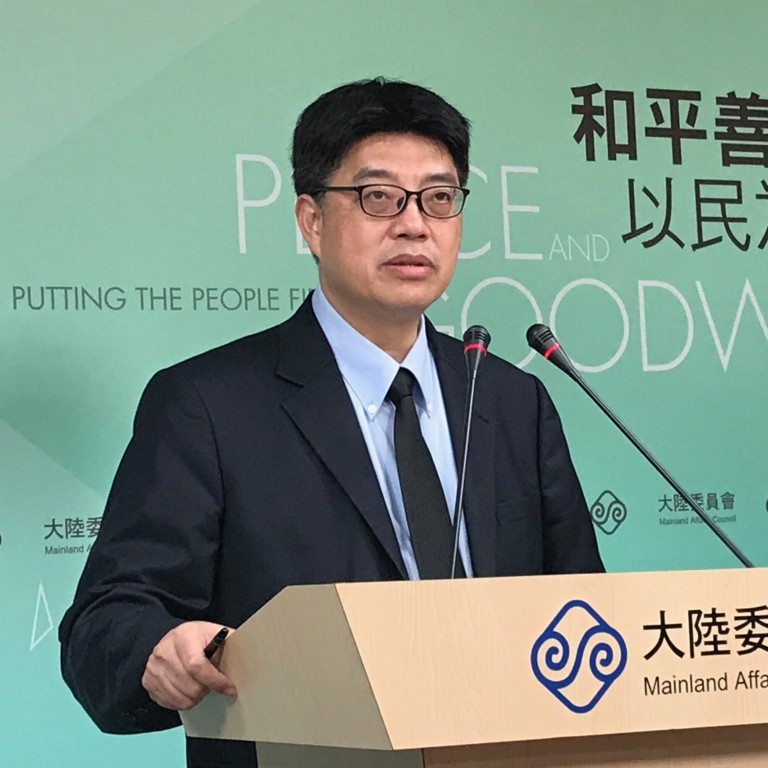
Taiwan-Hong Kong ties in jeopardy over work permits
- Taipei has accused Hong Kong of ignoring its requests to renew the work permits for staff at its de facto consulate in the city
- Eight officials will have to leave Hong Kong at the end of the year if their papers are not renewed
Ties were further strained this week when Taipei accused Hong Kong of ignoring its requests to renew the work permits of staff at Taiwan’s de facto consulate in the city.
Eight workers will be unable to stay in Hong Kong after their permits expire at the end of the year, according to the Mainland Affairs Council, which handles Taiwan’s dealings with mainland China.

Chiu Chui-cheng, its vice-chairman, said in legislature on Monday that the eight officials had applied for the permits in line with an agreement signed by the two sides in 2011 and that they had not done anything to breach the terms of that deal during their time in Hong Kong.
Meanwhile, Taipei has stopped issuing and renewing work permits for Hong Kong officials based in Taiwan, citing “parity and reciprocity” and “upholding national dignity,” according to sources from the Mainland Affairs Council.
Will Taiwan’s allies switch allegiance to Beijing to obtain vaccines?
Larry Chu, deputy director general of the Hong Kong Economic, Trade and Cultural Office in Taipei, and acting chief since mid-2018 is about to complete his tenure soon, said a source familiar with the matter. There were several other senior officials whose tenures were due to expire this year, the sources said.
The two sides set up the Taiwan-Hong Kong Economic and Cultural Cooperation Council, and Hong Kong-Taiwan Economic and Cultural Cooperation Council in 2010 when relations were amiable under former Taiwanese president Ma Ying-jeou from the Kuomintang, which favours better ties with Beijing. The two councils agreed to open representative offices – Taipei Economic and Cultural Office in Hong Kong and the Hong Kong Economic, Trade and Cultural Office in Taipei – in 2011.

The representative offices are allowed to perform some consular functions, such as issuing visas, and provide support to their representatives on matters of trade, culture and other businesses. Workers must renew their visas every three years.
Chiu told a news conference on Thursday that the eight officials would continue working as long as they could and had made contingency plans to continue operating the office if they were forced to leave.
“The [Taiwan] government has many times urged the Hong Kong side to take into account the general well being of the people from both sides and not set up unnecessary obstacles in the hope we can return to our consensus in handling relevant issues and maintain normal exchanges as well as protecting the rights and benefits of the people from the two sides,” he said.
Taiwan holds out hope of 11th-hour invitation to World Health Assembly with support of the West
Taiwan, which has 55 local hires at the office, originally had 19 officials in Hong Kong in charge of consulate, economic, information, cultural, general and liaison affairs.
But since 2018, Hong Kong authorities have required that all Taiwan officials sign a document recognising the one-China principle before being issued with work permits. But the officials refused to sign the document, which created the problem they now face, according to the Mainland Affairs Council.
“The two sides might end up without official representatives, leaving just local staff and basic functions like issuing tourist and business visas, which was the same when cross-strait relations were bitter,” said Stephen Tan, president of the Cross-Strait Policy Association, a think tank in Taipei.
This would discourage exchanges and worsen relations between Taiwan and Hong Kong, he said.
The imposition by Beijing of a national security law in Hong Kong had also created problems as some in Taipei feared it could be used to penalise Taiwanese people who supported dissidents in Hong Kong, Tan said.

